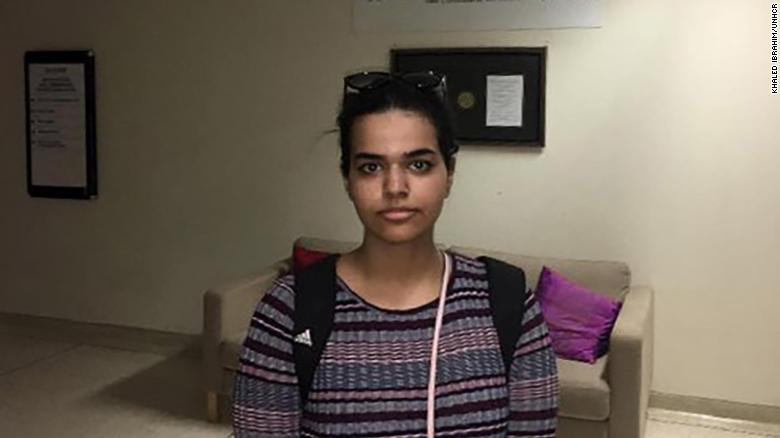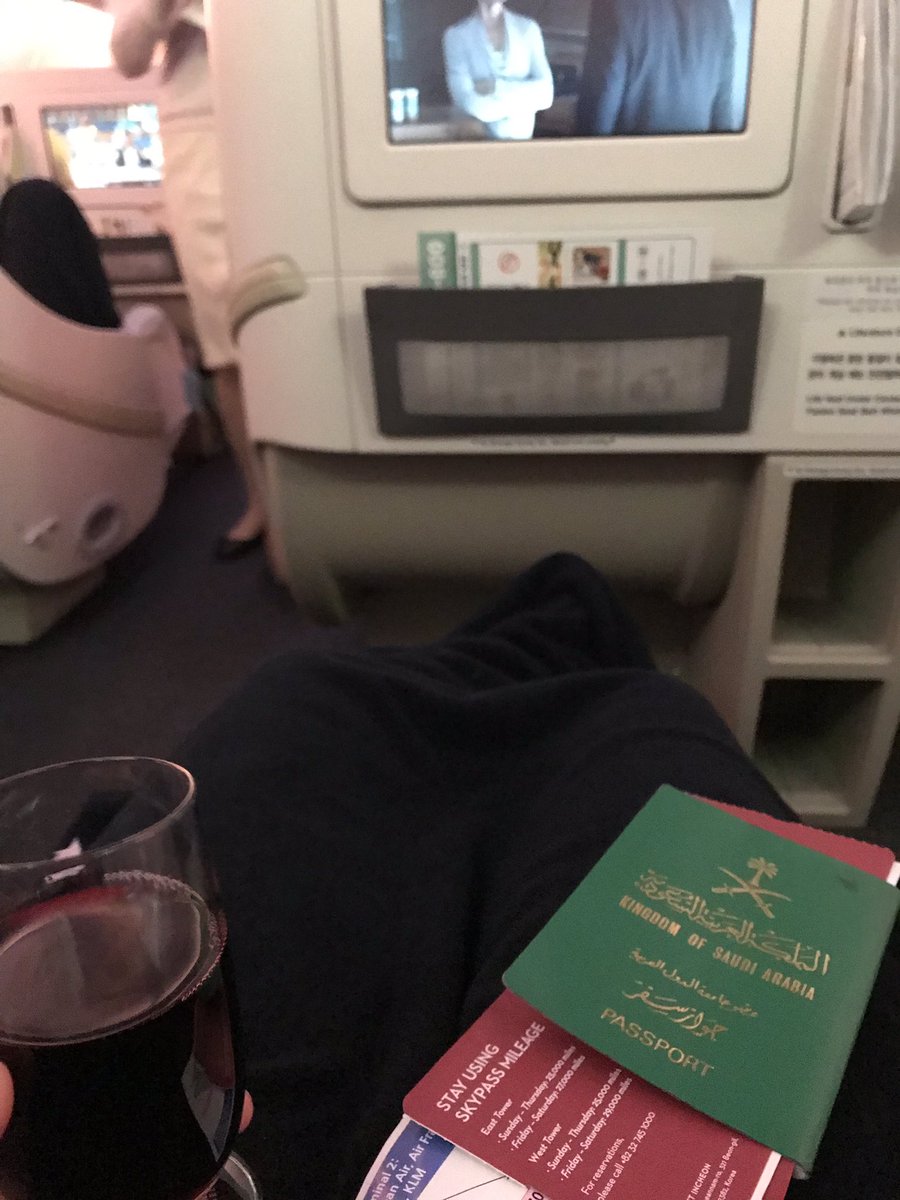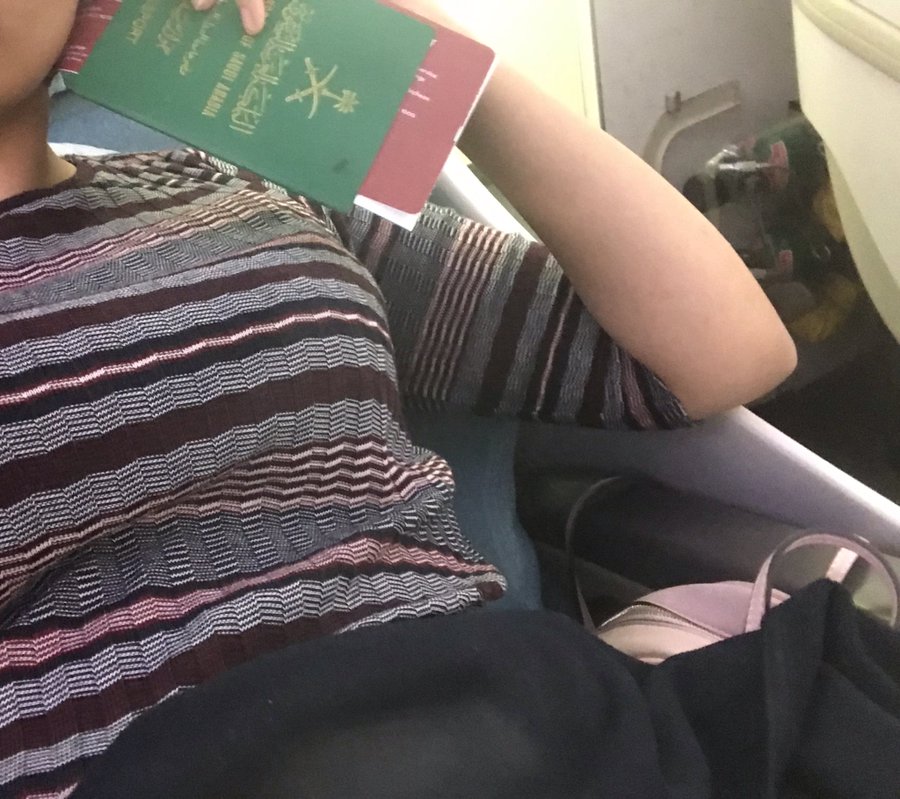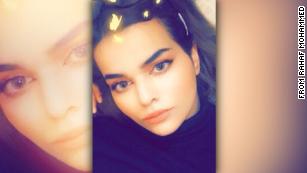Saudi teen lands in Canada after fleeing family

Saudi teen arrives in Canada for resettlement 01:40
(CNN)A Saudi teen who fled to Thailand to escape her allegedly abusive family has arrived in Canada after being offered asylum there.
Rahaf Al-Qunun left Bangkok for Toronto on Friday after a day of confusion over where she would be resettled. Canadian Prime Minister Justin Trudeau later told reporters his nation had accepted the request made by the UN refugee agency, UNHCR.
Canada's Minister of Foreign Affairs Chrystia Freeland is expected to brief the media later on the 18-year-old's case.
The Australian government earlier welcomed the news that Qunun had been offered asylum by Canada and defended its own handling of the matter.
Thailand's immigration police chief Surachate Hakparn had initially told CNN on Friday that Qunun had been offered asylum by both Australia and Canada. But he later requested that the statement be retracted.

Rahaf al-Qunun was supported by the UN refugee agency, UNHCR, after reaching Bangkok.
Australian Immigration Minister David Coleman said in a statement Saturday that Australia had still been considering the 18-year-old's asylum claim and that her safety had always been his government's primary concern.
"Australia has one of the most generous humanitarian programs in the world, and all applications are considered in accordance with Australian law and procedures," Coleman's statement said. "We wish Ms Al-Qunun all the best for her future in Canada."
Canada's decision to offer asylum to Qunun may do little to mend relations with Saudi Arabia, which nosedived last summer after officials in Ottawa accused the kingdom of human rights violations and demanded the release of imprisoned activists.
Saudi Arabia responded by freezing new trade and investment deals, suspending flights to Canada, reassigning students studying there and expelling Canada's ambassador to Saudi Arabia, while recalling its own.
Teen feared her family would kill her
Qunun had flown to Thailand from Kuwait to escape her family, saying she feared they would kill her because she renounced Islam. She had intended to fly on to Australia, but barricaded herself in a hotel room in Bangkok's main airport on Sunday after Thai immigration officials attempted to deport her back to the Middle East.
Qunun and her supporters drew global attention to her case through a social media campaign launched mostly on Twitter. She documented her arrival and subsequent detention in Bangkok on her smartphone, creating new Twitter and Periscope accounts where she received a deluge of supportive messages.
In response to the media campaign, Thai authorities allowed Qunun access to the UNHCR and did not deport her to Kuwait.
The Twitter account used by Qunun throughout her appeal for asylum was temporarily deactivated Friday but she later reappeared online, posting images from an airplane seat of what appeared to be her Saudi passport and boarding pass.
"3rd country," she said, in a reference to resettlement in Canada. "I did it."
She also thanked the supporters she said had saved her life. "Truly I have never dreamed of this love and support. You are the spark that would motivate me to be a better person," she said.
It is not an automatic right for refugees to be resettled and fewer than 1% of the millions of registered refugees globally were resettled in 2017, according to the UNHCR.
The process is often assessed on the urgency of a refugee's individual needs, with the most vulnerable -- such as women at risk -- prioritized. Refugees can wait from nine months to several years to hear an answer -- longer if they appeal a refusal. Some can wait their whole lives for a third country to accept them.
UNHCR welcomed Canada's decision to "provide international protection and a long-term solution" for Qunun as a resettled refugee.
"The quick actions over the past week of the Government of Thailand in providing temporary refuge and facilitating refugee status determination by UNHCR, and of the Government of Canada in offering emergency resettlement to Ms. al-Qunun and arranging her travel were key to the successful resolution of this case," the agency said in a statement.
Qunun's case was dealt with on a fast-track "emergency" basis in light of the urgency of her situation, the UNHCR said.
UN High Commissioner for Refugees Filippo Grandi said the Saudi teenager's plight had highlighted the precarious situation faced by millions of refugees worldwide.
"Refugee protection today is often under threat and cannot always be assured, but in this instance international refugee law and overriding values of humanity have prevailed," he said.
Thai official: 'She has determination'
Qunun's story has also put Saudi Arabia's male guardianship system, which restricts many aspects of women's lives, back under international scrutiny. Under the system, women must obtain permission from a male guardian -- who could be their father, husband, brother or son -- to travel, marry, and sometimes to work or access health care.
Hakparn, the Thai immigration official, said Qunun had continued to refuse to meet with her father and brother before leaving Thailand. The pair planned to leave Bangkok early Saturday, he said.
"This incident will end here for Thailand," he said. Hakparn described the situation as an "internal family problem" but added that since Qunun had "escaped her hardship to a better place, Thailand inevitably had to receive her according to human rights, humanity and rule of law."
Qunun had thanked the Thai authorities for their help before leaving and had been given a health check, Hakparn said.
"She said that as soon as she arrives in Canada, the first thing she will do is to learn the language. She has determination," he said.
"She is safe, and she is in good health, and good mental health. She looks happy."
CNN's Hamdi Alkhshali contributed to this report.
end quote from:
https://www.cnn.com/2019/01/12/asia/saudi-teen-australia-canada-asylum-intl/index.html








No comments:
Post a Comment